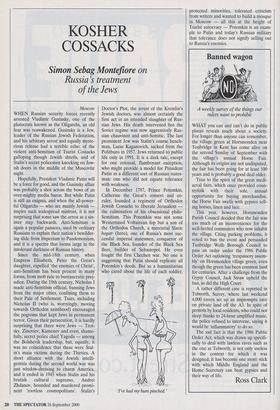Banned wagon
A weekly survey of the things our rulers want to prohibit
WHAT you can and can't do in public places reveals much about a society. For longer than anyone can remember, the village green at Horsmonden near Tonbridge in Kent has come alive on the second Sunday of September with the village's annual Horse Fair. Although its origins are not undisputed, the fair has been going for at least 100 years and is probably a good deal older.
True to the spirit of the great medi- aeval fairs, which once provided coun- tryfolk with their sole, annual opportunity for buying merchandise, the Horse Fair swells with gypsies sell- ing horses, linen and lace.
This year, however, Horsmonden Parish Council decided that the fair was too much of an inconvenience for the well-heeled commuters who now inhabit the village. Citing parking problems, it voted to ban the event and persuaded Tunbridge Wells Borough Council to pass an order under the 1986 Public Order Act outlawing Vespassory assem- bly' on Horsmonden village green, even though the green has been common land for centuries. After a challenge from the Gypsy Council, Jack Straw upheld the ban, as did the High Court.
A rather different case is reported in Tolworth, Surrey, where last weekend 4,000 ravers set up an impromptu rave on private land off the A3. In spite of protests by local residents, who could not sleep thanks to 24-hour amplified music, the police refused to intervene, saying it would be 'inflammatory' to do so.
The sad fact is that the 1986 Public Order Act, which was drawn up specifi- cally to deal with lawless raves such as the one at Tolworth, is not only useless in the context for which it was designed; it has become one more stick with which Middle England and the Home Secretary can beat gypsies and their way of life.
Ross Clark


































































 Previous page
Previous page